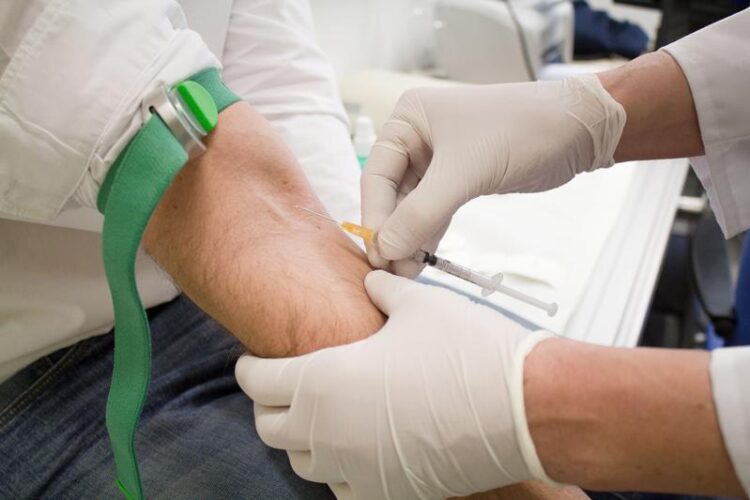Tübingen study raises hope for effective malaria vaccine

The vaccine is injected into the subject at the same time as they receive an antimalarial drug.
Paul Mehnert / Universität Tübingen
At the University Hospital of Tübingen, a clinical trial led by Professor Dr. Peter Kremsner, Director of the Institute for Tropical Medicine, Travel Medicine and Human Parasitology and Dr. Rolf Fendel, Research Group Leader at the Institute of Tropical Medicine partnered with the German Center for Infection Research (DZIF), was able to show that the vaccine, “Sanaria PfSPZ-CVac”, which is being developed in Tübingen together with the biotechnology company Sanara Inc., provides 77 percent cross-train protection against malaria parasites. The study is currently published in the renowned scientific journal “Nature Communications.”
„PfSPZ-CVac“ is a live vaccine consisting of infectious Plasmodium falciparum (Pf) malaria parasites that are injected into the subject at the same time as they receive an antimalarial drug. The parasites quickly enter the liver where they develop and multiply for seven days, and then emerge into the blood. As soon as the parasites leave the liver, the drug kills them immediately. Thus, the immune system of the vaccinated subject is primed against many parasite proteins and becomes highly effective at killing malaria parasites in the liver to block infection and prevent disease.
“With this study, we have reached a new important milestone in the development of an effective malaria vaccine. With only three immunizations over four weeks, we achieved very good protection against malaria,” explains Professor Peter Kremsner. His team was able to develop a new immunization regimen that significantly reduces vaccine administration compared to previous studies. The number of visits required by a subject for complete immunization has been reduced from 13 to three. Importantly, the team showed that vaccination with parasites from Africa could protect against genetically diverse parasites from South America.
Proof of efficacy was provided using the controlled human malaria infection (challenge) regimen developed in Tübingen as part of a DZIF project together with Sanaria. Here, the test subjects were infected with parasites after immunization. If immunization against the parasites was successful, the parasites would be specifically killed by the immune system. If the immune protection is incomplete and the parasites multiply, the test subjects are treated before any symptoms of disease appear. Ten of 13 subjects vaccinated in this study were completely immune to the infection.
“The vaccine produces a high level of different antibodies and immune cells in the body that can recognize both the injected parasites and antigens of the subsequent liver stage. These antibodies and immune cells contribute to the strong protective immunity” explains Dr. Rolf Fendel.
With an estimated 229 million infections and 409,000 deaths worldwide in 2019, malaria is one of the world’s most important and dangerous infectious diseases. It is caused by parasites transmitted to humans through the bites of infected female mosquitoes. Children under the age of five are the most vulnerable group affected by malaria, accounting for 67 percent (274,000) of all malaria deaths worldwide in 2019.
Original title of the publication: Zita Sulyok et. al. Heterologous protection against malaria by a simple chemoattenuated PfSPZ vaccine regimen in a randomized trial. Nature Communications (2021)
About Sanaria Inc.
Sanaria is a biotechnology company based in Rockville, Maryland (USA) that is developing whole parasite PfSPZ vaccines to protect against malaria in collaboration with the University Hospital of Tübingen, Germany. Sanaria’s vaccines have been shown to be highly protective against Plasmodium falciparum infections in humans. Sanaria’s vaccines will be used to prevent malaria in individuals and in combination with other malaria control measures to stop malaria transmission and eliminate malaria.
About the DZIF
The German Center for Infection Research (DZIF) coordinates translational infection research in Germany and provides strategic direction. Its mission is to translate results from basic infectious disease research into clinical research and bring them to patients. 35 DZIF research institutions work together against the global threat of infectious diseases. The Tübingen site coordinates the research area Malaria with site spokesperson Prof. Peter Kremsner, and co-coordinators are active at the site for Gastrointestinal Infections, Hospital Germs and Antibiotic-Resistant Bacteria and New Antibiotics.
Wissenschaftliche Ansprechpartner:
University Hospital Tübingen
Medical Clinic
Internal Medicine VII
Institute for Tropical Medicine, Travel Medicine and Human Parasitology
Prof. Dr. Peter Kremsner
Wilhelmstraße 27, 72074 Tübingen
Tel. +49 7071 29- 87179
peter.kremsner@uni-tuebingen.de
Originalpublikation:
The publication is available at the following link: https://www.nature.com/articles/s41467-021-22740-w
DOI: 10.1038/s41467-021-22740-w
Media Contact
All latest news from the category: Studies and Analyses
innovations-report maintains a wealth of in-depth studies and analyses from a variety of subject areas including business and finance, medicine and pharmacology, ecology and the environment, energy, communications and media, transportation, work, family and leisure.
Newest articles

A universal framework for spatial biology
SpatialData is a freely accessible tool to unify and integrate data from different omics technologies accounting for spatial information, which can provide holistic insights into health and disease. Biological processes…

How complex biological processes arise
A $20 million grant from the U.S. National Science Foundation (NSF) will support the establishment and operation of the National Synthesis Center for Emergence in the Molecular and Cellular Sciences (NCEMS) at…

Airborne single-photon lidar system achieves high-resolution 3D imaging
Compact, low-power system opens doors for photon-efficient drone and satellite-based environmental monitoring and mapping. Researchers have developed a compact and lightweight single-photon airborne lidar system that can acquire high-resolution 3D…





















